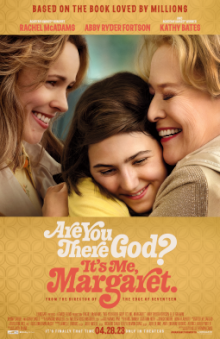Off the top of my head, I can’t think many any coming-of-age film that involves the main character needing to choose between different religions, so that’s enough to make this film interesting to me. Add to that how it boldly confronts issues like menstruation, and it’s no wonder this is a favorite of the critics. Strong as the pitch is, this film kind of flubs it by being too nice and too light-hearted. Margaret’s family is so sweet and so supportive and her problems so easily resolved with minimal fuss that we barely see her struggling with anything. It’s a pleasant film to watch but it feels like it ends too soon without Margaret having to get into any serious confrontations and that’s just not very satisfying.
In 1970, 11-year-old Margaret Simon is upset that her family is moving from New York City to New Jersey as it means changing schools, having to make new friends and being apart from her paternal grandmother Sylvia. Once there she finds that things aren’t so bad as they get to live in a nice, big suburban house and her neighbor Nancy proactively makes friends with her and inducts her into their existing friend group. Together they deal girl issues with their bodies changing with the onset of puberty, crushing on the cutest boy in class and worrying about whether their breasts are going to grow big enough. Meanwhile Margaret grapples with religion as her father is Jewish and her mother is Christian. She often speaks to God privately but doesn’t direct her prayers to any sect in particular. Realizing that she has never met her maternal grandparents, she questions her mother and learns that they cut ties when she married a Jew. Over the course of the year, Margaret revises her opinions on religion, learns that Nancy is perhaps not such a good person after all and grows ever so slightly more mature.
Between an adorable little girl protagonist and the earnestness with which she grapples with the issues of growing up, it’s tough to be too harsh on this film. There are any number of films about young people that involve religion but it’s comparatively rare to show the protagonist being exposed to different influences and needing to choose among them or perhaps realizing that she can choose none of them at all. The film handles menstruation with both courage and humor. It’s nice to watch how Margaret’s mother Barbara is consistently so supportive and understanding and how she is basically best friends with her grandmother Sylvia. The 1970s setting also makes it a nostalgia trip, a safer and more innocent time when Margaret and her friends are able to grow into their adult identities on their own terms.
Unfortunately the film is just too nice such that it’s not really saying anything interesting at all. There’s no confrontation of any sort when Margaret realizes that maybe Nancy isn’t such a good friend after all and the latter simply slinks away meekly. Margaret’s temporary disillusionment with god is so minor that it’s hard to believe that this is all there is. From at the very beginning when she throws a minor tantrum over being forced to move to New Jersey, it’s hard to treat it seriously when it’s so obviously an overall upgrade to their lifestyle with her father getting a promotion and the mother being able to quite her job while they move to a much bigger house. Sure, she’s an 11-year-old girl and these are the problems a girl her age feels are important, yet for us it looks like she’s living a charmed life.
As lighthearted films go, it’s not bad and it does deserve some praise for highlighting the neglected fact that children could use some kind and open-minded guidance when it comes to religion. But it really needs more of a bite to be elevated beyond being just a pleasant distraction.
